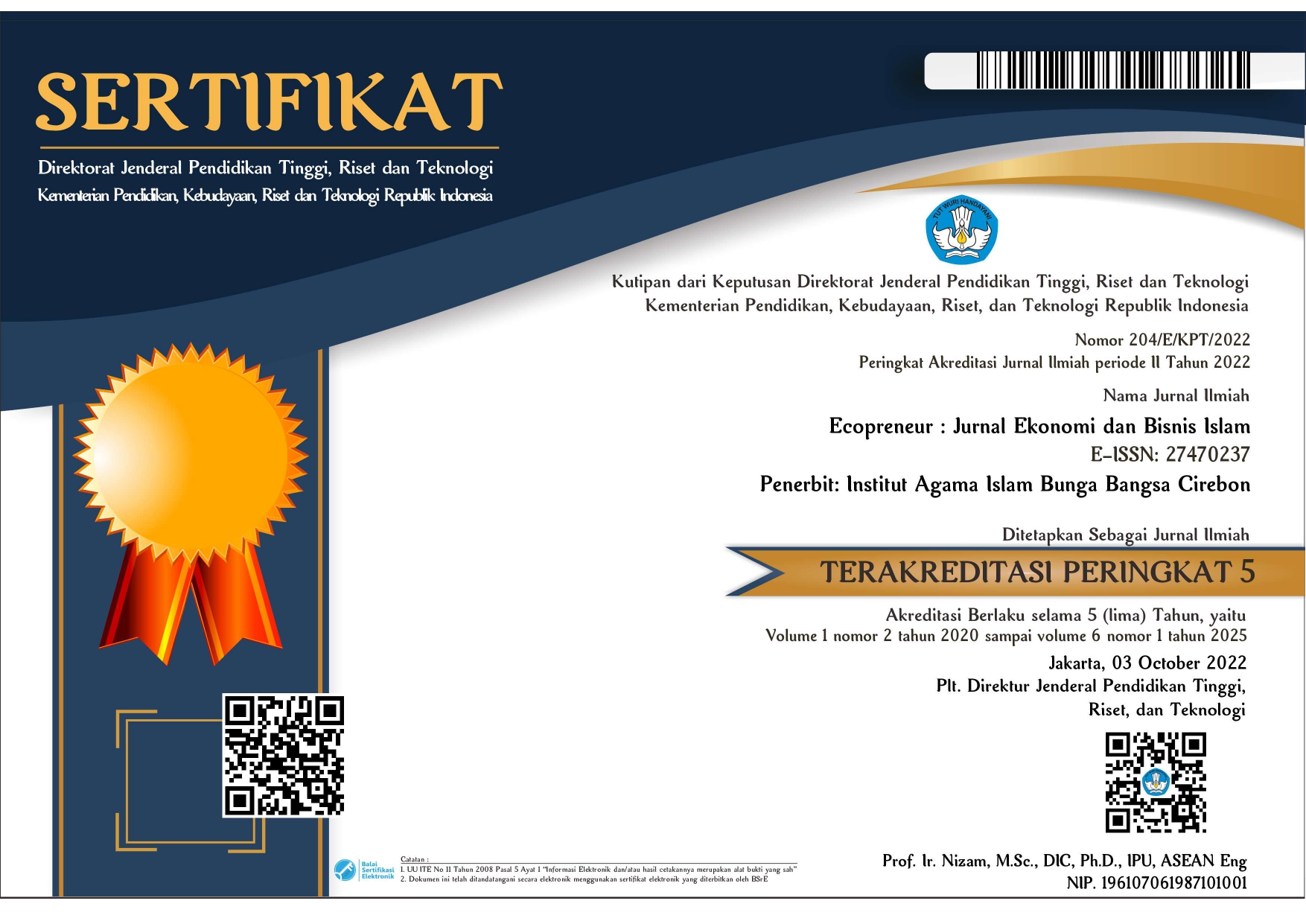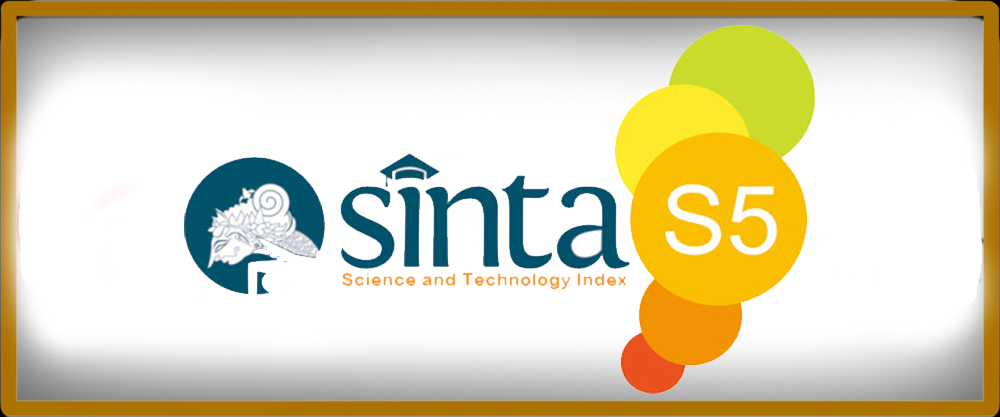Peran Ekonomi Islam Dalam Mengembangkan Ekonomi Nasional di Indonesia
Abstract
This research aims to examine further the role of Islamic economics in explaining the national economics. This research is qualitative research and uses library research. Data sources in research consist of primary data and secondary data. The data collection method used in this research is the documentation method. The data obtained in this research was further analyzed using the content analysis method. The research results show that sharia economics has an important role in national economic development. In developing the sharia economy in Indonesia, there are several obstacles faced, including: Limited Human Resources (SDI), Supervision of sharia economy, Lack of infrastructure, facilities and infrastructure both in terms of software and physical as well as Lack of socialization, promotion, information, education and coordination with all stakeholders, including the community, relevant government officials, ulama/ustad, and practitioners. The challenges faced by Indonesia in developing a sharia economy can still be overcome for strong reasons to improve people's welfare and Indonesia has a majority Muslim population.
Keywords: Islamic Economics, National Economics
Abstrak
Penelitian ini bertujuan untuk mengkaji lebih jauh peran ekonomi Islam dalam menjelaskan perekonomian nasional. Penelitian ini merupakan penelitian kualitatif dan menggunakan penelitian kepustakaan. Sumber data dalam penelitian terdiri dari data primer dan data sekunder. Metode pengumpulan data yang digunakan dalam penelitian ini adalah metode dokumentasi. Data yang diperoleh dalam penelitian ini dianalisis lebih lanjut dengan menggunakan metode analisis isi. Hasil penelitian menunjukkan bahwa ekonomi syariah mempunyai peranan penting dalam pembangunan perekonomian nasional. Dalam mengembangkan ekonomi syariah di Indonesia terdapat beberapa kendala yang dihadapi antara lain: Keterbatasan Sumber Daya Manusia (SDI), Pengawasan terhadap ekonomi syariah, Kurangnya sarana dan prasarana baik dari segi software maupun fisik serta Kurangnya sosialisasi, promosi , informasi, edukasi dan koordinasi dengan seluruh pemangku kepentingan, termasuk masyarakat, pejabat pemerintah terkait, ulama/ustad, dan praktisi. Tantangan yang dihadapi Indonesia dalam mengembangkan ekonomi syariah masih dapat diatasi karena alasan yang kuat untuk meningkatkan kesejahteraan masyarakat dan Indonesia memiliki mayoritas penduduk beragama Islam.
Kata Kunci : Ekonomi Islam, Ekonomi Nasional
Downloads
References
Khozin, A. A., Pratama, F. A., Ridwan, M., Amin, N. M. F., & Lesmana, T. (2022). Inflation and the Stability of Islamic Finance. ICOBBA_2021, 404-409.
Marleni, E., Mustoip, S., & Sulkhah, S. (2024). Implementation of the Literacy Movement in Shaping Student Character in Elementary School. EduBase: Journal of Basic Education, 5(2), 120-130.
Munajim, A., Pratama, F. A., Ridwan, M., & Rohimah, I. (2022). The Operations of the Bank Wakaf Micro Indonesia with the Scheme for the Economic Empowerment of the People. ICOBBA_2021, 1-6.
Nasir, A., Busthomi, A. O., & Rismaya, E. (2022). Shariah Tourism Based on Local Wisdom: Religious, Income, Motivation, Demand and Value of Willingness to Pay (WTP). International Journal Of Social Science And Human Research, 5(08), 3811-3816.
Pratama, F. A., Ridwan, M., Yulianti, N., Ratnawati, R., Maulana, A., & Masitoh, S. I. (2022). Implementasi Persamaan Fungsi Non Linier Dalam Matematika Bisnis Pada Kehidupan Sehari-Hari. Change Think Journal, 1(03), 289-299.
Pratama, G. (2022). Comparative Study of The Empowerment of Zakat BAZNAS Indonesia and PPZ Malaysia. ICOBBA_2021, 212-216.
Putri, Y. D. S., Mustoip, S., Nisa, D. H., & Ramadhani, N. U. (2024). Implementation of Audiolingual Methods in Understanding Arabic Color Concepts in Class I SDIT Alif Mardiyah. JPS: Journal of Primary School, 1(2), 1-6.
Ridwan, M., Motik, D. P., & Nurwahid, H. I. (2022). Afzalur Rahman's Thinking Concept: Relevance with Worker Ethics According to Global Standards. ICOBBA_2021, 322-329.
Selasi, D., Agustiani, L. R., & Vidiati, C. (2022). Upaya Mengubah Pendapatan Usaha Mikro Kecil Menengah (UMKM) Melalui Digital Marketing. Jurnal Multidisiplin Madani, 2(3), 1247-1258.
Selasi, D., Munajim, A., & Komala, S. I. (2022). The Digitization of Islamic Philanthrophy In the Islamic Capital Market in Indonesia. ICOBBA_2021, 166-174.
Selasi, D., Munajim, A., & Komala, S. I. (2022). The Digitization of Islamic Philanthrophy In the Islamic Capital Market in Indonesia. ICOBBA_2021, 166-174.
Selasi, D., Muzayyanah, M., Tatmimah, I., Sari, F., & Indriyani, R. (2022). Contribution of Islamic Capital Market to National Capital Market. INCOME: Innovation of Economics and Management, 2(1), 1-7.
Selasi, D., Vidiati, C., & Munajim, A. (2022). Pertumbuhan Bank Syariah di ASEAN: Dalam Sejarah The Growth of Islamic Banks in ASEAN: In History. Ecobankers: Journal of Economy and Banking, 3(2), 157-171.
Selasi, D., Vidiati, C., & Munajim, A. (2022). Pertumbuhan Bank Syariah di ASEAN: Dalam Sejarah The Growth of Islamic Banks in ASEAN: In History. Ecobankers: Journal of Economy and Banking, 3(2), 157-171.
Selasi, D., Vidiati, C., & Sumarno, S. (2022). Pasar Menabung Saham Pada Pasar Modal Indonesia. Ecopreneur: Jurnal Ekonomi dan Bisnis Islam, 3(1), 68-77.
Selasi, D., Vidiati, C., & Tardjono, T. (2022). Sharia Capital Market: Securities Fatwa, Derivative Securities and Mechanisms. IJOBBA: International Journal of Bunga Bangsa Cirebon, 1(1), 1-24.
Selasi, D., Virdiati, C., Munajim, A., & Sujata, T. (2022). Kesejahteraan Masyarakat: Analisa Kualitatif Sistem Keuangan Komersial Islam-SIstem Keuangan Sosial Islam di Indonesia.
Stefanus, S., & Ridwan, M. (2022). Analisis Strategi Marketing Syariah Untuk Meningkatkan Omset Penjualan Pada Era Globalisasi Di Toko Emas Pantes Sindang Laut Kabupaten Cirebon. Change Think Journal, 1(01), 87-95.
Vidiati, C., Al-Ghozali, M. I., Faturrizky, I., Selasi, D., Munajim, A., & Tardjono, T. (2022). Effects of the Money Market and the Need for Knowledge of Interest Rates and the Foreign Exchange Market for Benefit: Evidence In Indonesia. IJOBBA: International Journal of Bunga Bangsa Cirebon, 1(1), 37-60.
Vidiati, C., Hendra, E., Selasi, D., & Sumarno, S. (2022). Menilik Tas’ ir Keadilan dan Maslahah. Ecopreneur: Jurnal Ekonomi dan Bisnis Islam, 3(1), 78-92.
Wartoyo, W., Haida, N., Mujab, S., & Umam, M. K. (2022). Sharia Marketing Model Pada Bisnis Laundry Syariah (Case Study Pada Zada Laundry Syariah Sumber Cirebon). PROFIT: Jurnal Kajian Ekonomi Dan Perbankan Syariah, 6(1).












